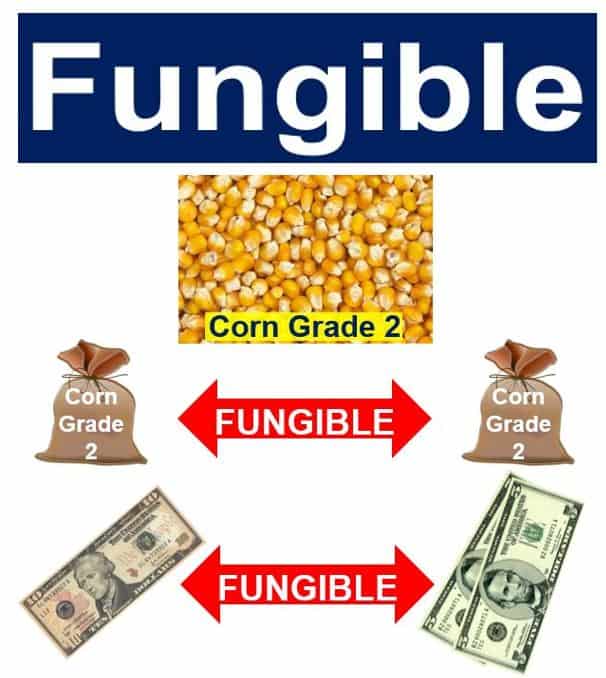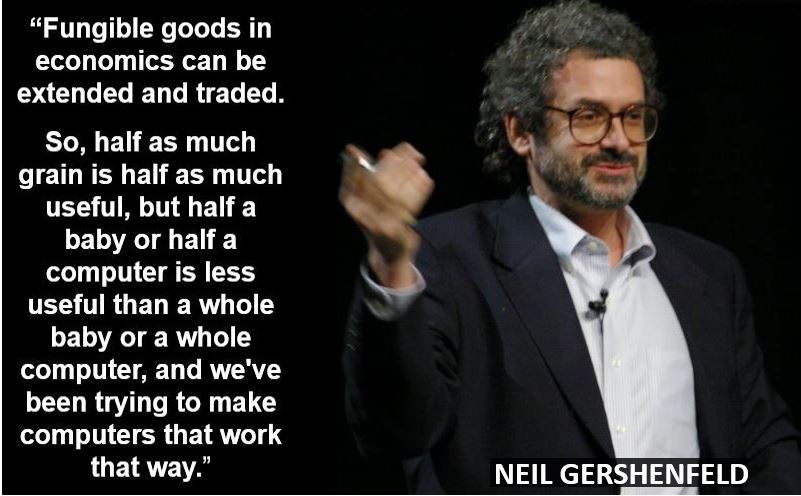Fungible refers to something that cannot be distinguished from another thing, it is interchangeable, substitutable, or uniform.
For example, if I lend somebody $10 by giving her a ten-dollar bill, I do not mind whether she pays me back with the same bill, another $10 bill, or two five-dollar bills.
The word ‘fungible’ is an adjective. The noun is ‘fungibility’.
Fungibility of commodities
Before a commodity can be traded on a commodity exchange it must be fungible.
One bar of gold must be tradable or exchangeable for another bar of gold, or two bars that are half the size and weight.
If two manufactured products are fungible, they are treated as commodities and must compete on the basis of availability and/or price.

If I bought ten Microsoft shares in 2006, another ten in 2007, and another ten in 2008 – I bought them at different times – they are all fungible, regardless of when I bought them.
Money must be fungible
Anything we want to use as money has to be fungible, whether it be bags of saffron, shells, beads or gold bars.
Goods that possess this fungibility property make the exchange and trade processes much more straightforward, because interchangeability assumes that every party values all goods of that class the same.
The Online *Etymology Dictionary says that the term ‘fungible’ with the meaning ‘capable of being used for another – capable of being replaced’, first appeared in the English language in Britain in 1818. It comes from Medieval Latin Fungibilis, which comes from the Latin Fungi, meaning ‘perform’, via phrases such as ‘Fungi vice’, meaning to take place.
* Etymology is the study of the origin of words. People who specialize in this are called etymologists.
Examples of fungible
Examples of fungible goods include oil, bonds, gold and other precious metals, money, and unopened items of consumer products on store shelves such as boxes of oatmeal or cereal. They possess fungibility if they have identical value and properties of other items. For example, two $5 bills and one $10 bill hold equal value.
Some items may be fungible today but not tomorrow. This may be the case with some consumer goods. Altered goods, such as opened, stained or return packages, do not hold the same value as their unopened or clean peers, and are therefore not fungible anymore.
Diamonds are not typically fungible. Diamond quality varies considerably among stones – it is virtually impossible to find two completely identical – and therefore equal – stones.

Fungilibity vs. liquidity
Fungibility is not the same as liquidity. If something can be easily exchanged for money or another good it is liquid.
Something is fungible if one unit of that product is substantially equivalent to another unit of the same product that has the same quality at a specific time and place.
Liquidity does not imply fungibility and vice-versa. Diamonds are liquid, they can be readily bought and sold. However, as no two stones are identical, one diamond cannot be easily swapped for another – diamonds are liquid but do not possess fungibility.
Fungible sometimes subjective
Imagine you borrow $10 from Alice. She does not mind how you pay her back, as long as it is in US currency. You can pay her back with two fivers or ten one-dollar bills.
Now imagine Alice lends you her car, a brand new red BMW 3 series. In theory, a brand new car is interchangeable for another car of the same brand and model.
However, if you did not return exactly the same car as the one she lent you, Alice would probably be upset.
If you went to a BMW dealer and swapped her vehicle for another brand new red BMW 3 series, and returned that one to Alice, she would probably not be happy.
In this BMW case, cars are not generally fungible when it comes to borrowing one that somebody lent you.
If, on the other hand, I was not happy with a brand new red BMW 3 series that a dealer sold me, and took it back and complained, I would probably be happy if they offered to replace it with another identical one. In this case, the car is fungible.
Other cases of fungibility or non-fungibility
Fungibility can be used to describe certain tasks that can be divided up into interchangeable pieces that are not interdependent on the other pieces and are easily parallelized (can be done at the same time). Imagine a 100 foot ditch needs to be dug, and a worker can dig a 10 foot ditch in one shift.
Either that worker is given 10 days to complete the whole task, or nine extra workers can be hired to complete the whole project in one shift.
In this case, each worker is able to complete his or her piece of the task without interfering with the other workers. More importantly, each digger is not dependent on the results of any of the others to complete his or her piece of the completed project.
Non-fungible tasks, however, are usually highly serial in nature and cannot be completed before the earlier pieces or steps are done.
Imagine you have nine women in front of you, they are all exactly one month pregnant. Does this mean that a complete baby is formed because 9 x 1 month each = 9 months? No it doesn’t. Each pregnant woman’s one-month period is not fungible. For month 9 to be completed month 8 most be completed first, for month 8 to be completed…, etc.
One, two, three…ten workers can make that one ditch, but only one woman can make one baby – nine women together cannot make that one baby.
Derivatives of “fungible”
Below, you can see various derivatives of the word “fungible,” their meanings, and how we can use them in a sentence:
Fungible (adjective)
Able to replace or be replaced by another identical item; mutually interchangeable.
Example: “Gold is considered a fungible commodity because each unit is equivalent to another.”
Fungible (noun)
An item that is interchangeable with others of the same type. Note: This is not a commonly used term; “fungible item” is preferred.
Example: “The trader viewed each barrel of oil as a fungible, with no concern for which specific one was delivered.”
Fungibility (noun)
The quality of being interchangeable.
Example: “The fungibility of cryptocurrency units makes them ideal for use in blockchain technology.”
Non-fungible (adjective)
Unique and not able to be replaced with something else.
Example: “Each painting in the gallery is non-fungible, possessing unique traits that set it apart.”
Fungibles (plural noun)
Items, especially commodities or currencies, that are interchangeable with others of the same type. Note: This term is not commonly used; “fungible items” is preferred.
Example: “In his portfolio, he preferred fungibles like treasury bonds over more volatile stocks.”
There are no derivative verbs or adverbs of the term “fungible.”
